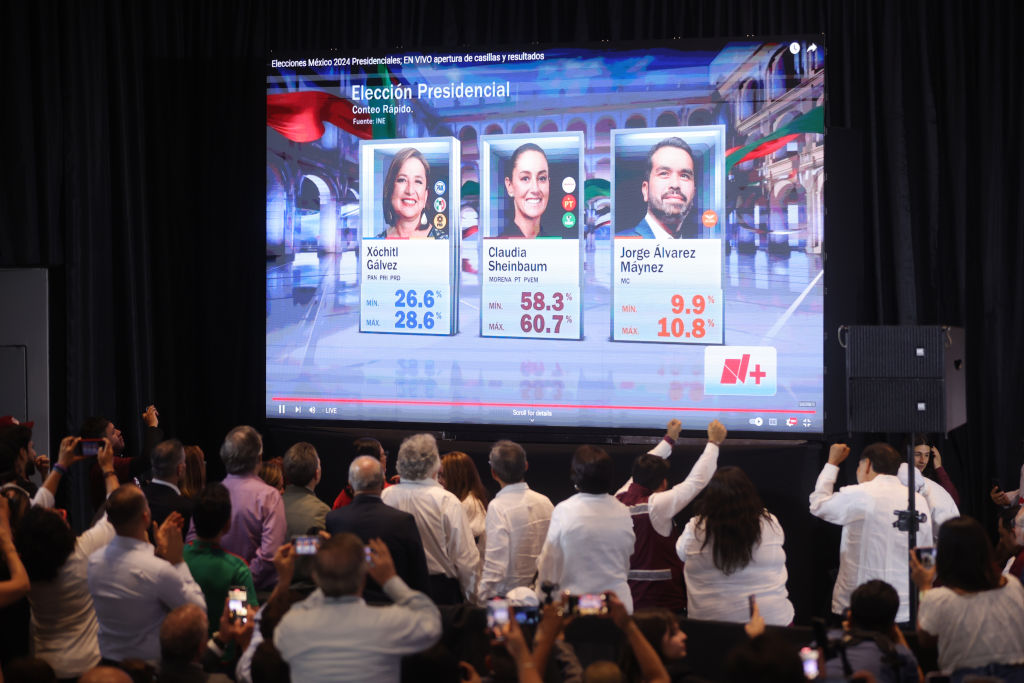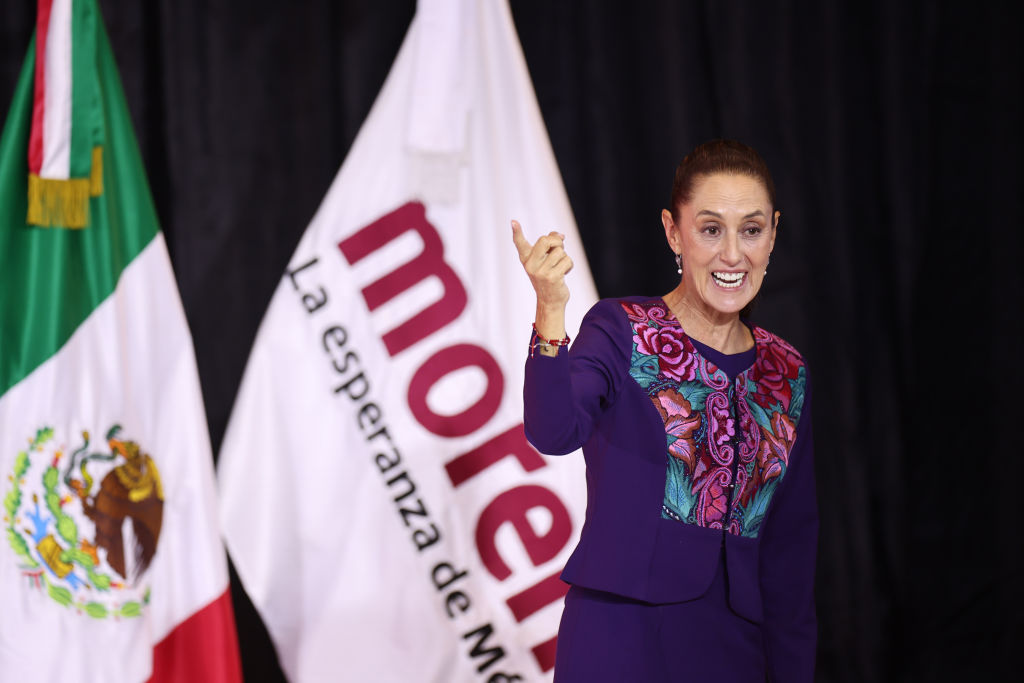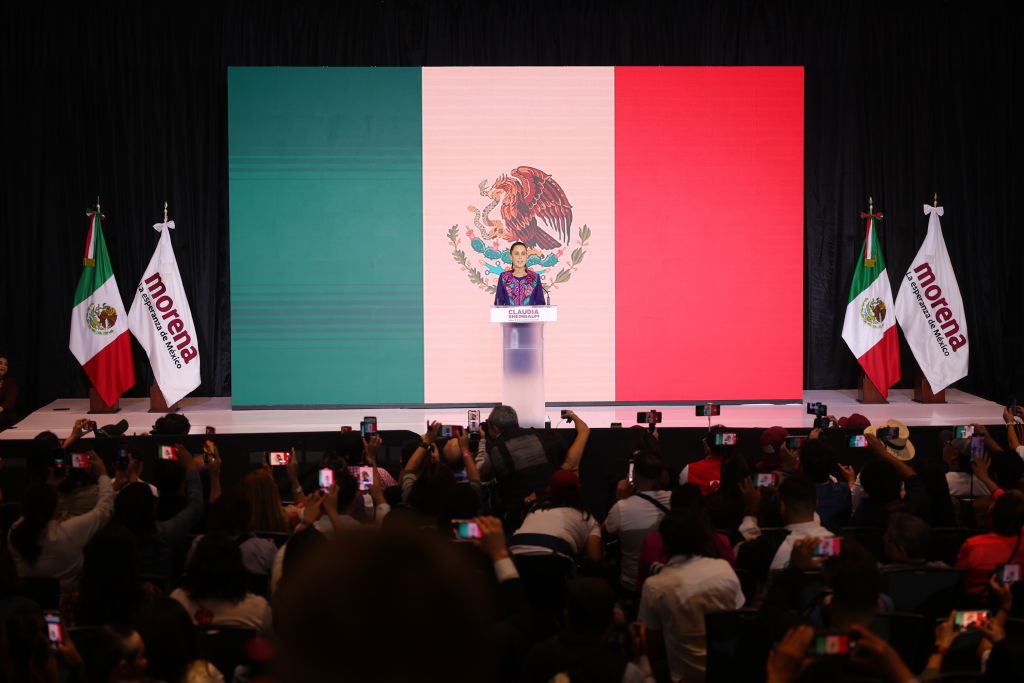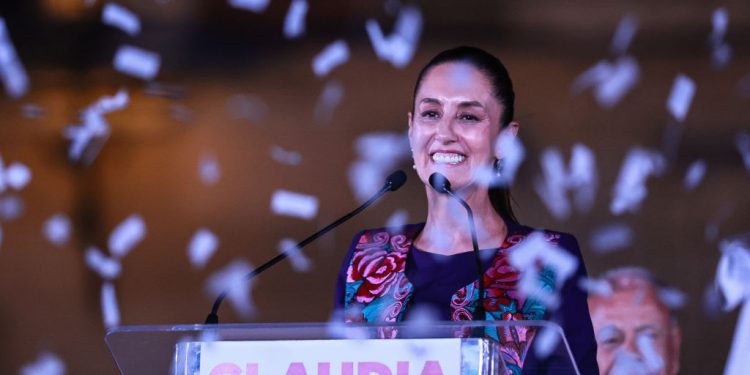The 2024 Mexican Election
Sequence of events
- Claudia Sheinbaum won Mexico’s June 2 presidential election with a promise to continue the populist agenda of outgoing President Andrés Manuel López Obrador (AMLO).
- The ruling MORENA party and its allies are projected to nearly secure supermajorities in Congress, minimizing the need for opposition support for constitutional amendments.
- Sheinbaum has outlined few policy specifics, indicating continuity with AMLO’s agenda of expanded social programs, state intervention in the economy, and a less confrontational approach to public security.
- The president-elect has promised close U.S. relations, emphasizing trade, nearshoring, and defending Mexicans abroad, though it’s unclear if she will seek closer security cooperation with the United States.
The Texas Public Policy Foundation Reported that
The 2024 elections unfolded as the most violent in the history of modern Mexico. In a May report, Integralia Consultores had counted 560 acts of political violence during the 2024 election cycle—87% more than the 2021 midterm election cycle. At least 30 candidates or potential candidates—mostly on the municipal level—were murdered.
During the 2024 campaign, (Sheinbaum) questioned the DEA’s annual National Drug Threat Assessment, saying, “This is not the first time that the DEA produces a baseless report.”
Despite initial misgivings, AMLO appeared to have found common ground with Biden, namely on their mutual displeasure with Texas’s border protection measures. He wrote a letter to Biden, “You’re the first president in decades who hasn’t sought publicity building walls on our border.”
Sheinbaum promoted better policing in Mexico City and has spoken of doing the same on the national level. However, she will confront a powerful military, which has assumed increased security tasks in recent years—along with other civilian tasks such as operating railways and airports.
The new president assumes office at a time of promise for Mexico. Nearshoring, in which companies relocate supply chains and operations closer to the U.S. market for commercial and geopolitical reasons, appears likely to favor Mexico.
Sheinbaum takes the oath of office October 1, but the person who will ultimately wield power remains a mystery to most Mexicans.
The Mexico Elections and what it Means for Texas and the US!
Claudia Sheinbaum secured the Mexican presidency in the June 2 election, defeating opposition candidate Xóchitl Gálvez by nearly 30 points.

“According to Wikipedia Claudia Sheinbaum Pardo was born on 24 June 1962] to a secular Jewish family in Mexico City. Her paternal Ashkenazi grandparents emigrated from Lithuania to Mexico City in the 1920s. Her maternal Sephardic grandparents emigrated there from Sofia, Bulgaria, in the early 1940s to escape the Holocaust. She celebrated the major Jewish holidays at her grandparents’ homes.Both of her parents are scientists: her mother, Annie Pardo Cemo, is a biologist and professor emeritus at the Faculty of Sciences at the National Autonomous University of Mexico, and her father, Carlos Sheinbaum Yoselevitz, was a chemical engineer. Her brother, Julio, is a physicist”
She ran on a platform of continuing the political project of her mentor, outgoing President Andrés Manuel López Obrador (AMLO).

Sheinbaum garnered over 58% of the vote, surpassing the 53% AMLO received in 2018, marking the highest support for a presidential candidate since 1976.
At 61, she is Mexico’s first female president, and her coalition, Together Let’s Keep Making History, mirrors López Obrador’s 2018 coalition name.
This election also marked a significant moment in Mexican politics as both main electoral coalitions nominated women, a result of a 2014 political reform mandating gender parity in party nominations. Sheinbaum, who identifies as non-religious, also becomes Mexico’s first Jewish president.
Jorge Álvarez Maynez of the small Citizen Movement (MC) party finished third with about 10% of the vote, facing accusations of playing a pro-government spoiler role.

AMLO’s influence loomed large over the election, framing it as a referendum on his administration’s “Fourth Transformation of Mexican History.”
Sheinbaum’s campaign promised continuity with AMLO’s policies, including cash-stipend schemes for seniors and single mothers, state control over the energy sector, and the “hugs, not bullets” security policy.
The MORENA party, along with the Green Party (PVEM) and Workers’ Party (PT), nearly achieved supermajorities in Congress, allowing Sheinbaum to push through significant constitutional amendments with minimal opposition. AMLO had campaigned for these supermajorities to pass 20 constitutional amendments before leaving office.
Despite her historic victory, Sheinbaum is somewhat of an unknown quantity. Her political career has been closely tied to AMLO, and her campaign provided little indication of significant departures from his policies. She takes office on October 1, facing significant challenges such as widespread drug cartel violence, with over 180,000 homicides recorded since AMLO took office in December 2018.

Relations with the United States will need mending, particularly regarding cooperation with the Drug Enforcement Administration (DEA) and handling sensitive issues like fentanyl trafficking. Trade disputes under the USMCA agreement also require attention, especially with the 2026 review approaching.
AMLO’s tenure saw signs of democratic decline, with attempts to undermine independent institutions and critical media. Sheinbaum has supported AMLO’s reforms that weakened autonomous agencies and the judiciary.
Sheinbaum will also need to manage the military’s increased role under AMLO, which now handles various public services and infrastructure projects. AMLO’s austerity measures, followed by increased social program spending ahead of the election, have left a record deficit for Sheinbaum to address.
Nearshoring offers economic opportunities, with investment flowing into cities like Monterrey. However, investment uncertainty, rule of law concerns, insecurity, and energy shortages under AMLO’s nationalistic policies could undermine these prospects.
This report reviews the impact of López Obrador’s administration on Mexico and its relationship with the U.S. and Texas, and anticipates the challenges and opportunities for Sheinbaum’s presidency.
Political Background
Claudia Sheinbaum Pardo has left an indelible mark on Mexican politics, particularly as the Mayor of Mexico City. An environmental engineer by training, Sheinbaum’s journey from academia to political prominence is characterized by her alignment with President Andrés Manuel López Obrador (AMLO) and her contributions to urban development and public policy in the capital. This article delves into her career, achievements, controversies, and her influence on Mexico City’s political landscape.
Early Career and Political Ascendancy
Sheinbaum’s political career commenced at the invitation of AMLO in 2000, when she served as the environment secretary during his mayoral tenure from 2000 to 2005. In this role, she oversaw significant projects such as the construction of elevated freeways, which aimed to alleviate traffic congestion in the city. Her entry into politics followed her tenure as a student activist and climate scientist at the National Autonomous University of Mexico (UNAM), marking the beginning of her close association with López Obrador.
In 2015, Sheinbaum became the borough chief of Tlalpan, a district within Mexico City, further solidifying her political standing. Her leadership qualities and alignment with AMLO’s vision led to her election as the Mayor of Mexico City in 2018, a position she held until 2023.
Tenure as Mexico City Mayor
Urban Mobility and Public Health
As Mayor, Sheinbaum spearheaded several initiatives aimed at improving urban mobility and public health. One of her notable achievements was the implementation of cable car systems connecting remote neighborhoods, which significantly enhanced transportation options for residents. Additionally, her administration managed a competent COVID-19 vaccination program, which was crucial in mitigating the pandemic’s impact on the city.
Public Security and Crime Reduction
Sheinbaum also focused on public security, with her administration claiming a more than 50% reduction in homicide rates and serious crimes. This achievement was highlighted as a testament to her effective governance and commitment to ensuring the safety of Mexico City’s residents.
Controversies and Criticisms
Despite these achievements, Sheinbaum’s tenure was not without controversy. Critics pointed to the high excess mortality rates during the COVID-19 pandemic, which some attributed to pre-existing comorbidities among the population. Furthermore, her administration faced accusations of impeding researchers’ access to death certificates, contradicting her claims of digitizing government operations to reduce bureaucratic hurdles.
One of the most significant controversies was the collapse of an elevated portion of Línea 12 in 2021, which resulted in 26 fatalities. This incident drew criticism over maintenance practices and construction negligence, with Sheinbaum rejecting the investigators’ findings as biased.
Political Challenges and Allegations
The collapse of Línea 12 had broader political implications, as it reflected poorly on AMLO’s governance, given that politicians aligned with him had governed the capital since 2000. The incident, coupled with frequent service stoppages in the Mexico City Metro, underscored the challenges Sheinbaum faced in maintaining critical infrastructure. A collision between trains in January 2023, which left one passenger dead and over 50 injured, further exacerbated these issues. In response, Sheinbaum alleged sabotage and sought AMLO’s intervention, resulting in the deployment of 6,000 National Guard members to the metro.
Political Philosophy and Public Perception
Sheinbaum has often described Mexico City as “the city of rights,” reflecting its progressive stance on issues such as abortion decriminalization and same-sex marriage. However, her close alignment with AMLO and deference to his policies have drawn criticism from residents who prefer leaders that challenge the federal government. This sentiment likely contributed to the setbacks faced by her party, MORENA, in the 2021 midterm elections, where the PAN-PRI-PRD coalition gained significant ground.
Conclusion
Claudia Sheinbaum’s tenure as Mayor of Mexico City was marked by a blend of significant achievements and notable controversies. Her efforts to improve urban mobility, public health, and security were counterbalanced by challenges in infrastructure maintenance and political opposition. As she transitions to a broader role in Mexican politics, her legacy in Mexico City offers valuable insights into her leadership style and policy priorities.





